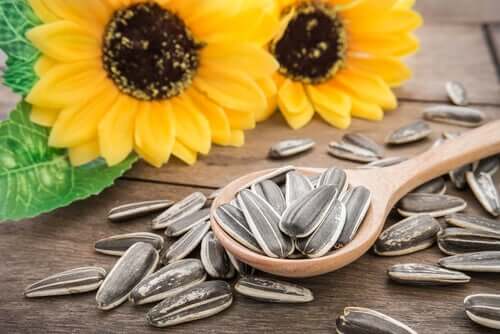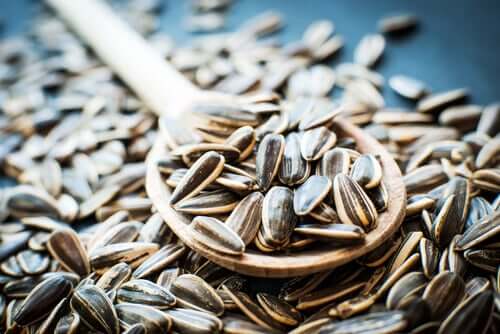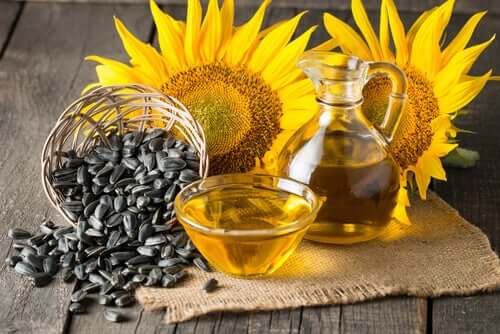Sunflower Seeds: 3 Amazing Benefits for Your Pets

The sunflower (Helianthus annuus) is one of the most important crops in the world. Moreover, they have great economic significance since sunflower seeds are oilseeds, which means that oil can be extracted from them.
Traditionally, and regardless of its nutritional value, sunflower oil has been used therapeutically in humans. Treating health ailments as colds, intestinal discomfort, or even rheumatic pain to name a few. In this article, we’ll explore some great benefits sunflower seeds can bring to your pets.
Sunflower seeds and their nutritional value
Sunflower seeds are among the best sources of vegetable protein available. Because of that, their nutritional and functional properties have been widely studied.
Studies carried out on this particular plant have determined that every 4 oz of sunflower seeds contain 0.7 oz of protein, 1.8 oz of total lipids, 3.02 grams of ash, 0.1 oz of carbohydrates and 0.3 oz of fiber. This alone represents a caloric contribution or total energy of 584 kilocalories / 4 oz.
Sunflower seeds are also a good mineral source. The USDA (2019) gives out the following composition: every 4 oz of seeds contains (in milligrams): phosphorus (660), potassium (645), magnesium (325), calcium (78), selenium (53), sodium (9), iron (5.25), zinc (5), and copper (1.8).
Among its nutrient list, an important source of Vitamin E (alpha-tocopherol) stands out with 35, 17 milligrams / 4 oz.

1. Their Vitamin E content prevents cardiovascular disease
Various scientific studies have shown that the phytochemicals found in sunflower seeds such as tocopherols and phenolic compounds have potent antioxidant properties. For this reason, such compounds can inhibit lipid oxidation processes, helping to prevent heart disease and death from cardiac causes.
Vitamin E is an important vitamin required for the proper function of many organs in the body. It’s also an antioxidant, as we mentioned before. This means it helps to slow down processes that damage cells.
2. Sunflower seeds improve coat health and help heal skin wounds
Sunflower oil is a mixture of mainly polyunsaturated fat, linoleic acid (59% of the total), monounsaturated fat and oleic acid (30% total). Linoleic acid belongs to the fatty acids family classified as omega-6, while oleic acid falls within omega-9.
According to scientific literature, these fatty acids can have both promoting and reducing effects on inflammation. However, this would depend on the omega-6 or omega-3 intake ratio.
In the year 2001, scientists tested the effects of a sunflower seed supplemented diet on the skin and coat conditions of 18 dogs. As a result, their findings showed that the use of sunflower seed supplements improved the dogs’ coat health.
These results are complemented by other groups of experts’ findings who have independently reported:
- Five nutrients present in sunflower seeds improve the skin’s barrier capacity in healthy dogs
- Sunflower oil supplementation is effective as an aid in the treatment of canine atopic dermatitis
3. Pancreatic activity improved
Rich sunflower oil diets have been shown to induce a pancreatic response to foods. Specifically, they increase the pancreatic electrolyte and enzyme content such as lipase found in the released juice.

This information may be useful when finding the most appropriate nutritional therapy for dogs recovering from gastrointestinal diseases.
There’s no doubt about the beneficial role of sunflower seed consumption. They provide energy, essential fatty acids, minerals, and fat-soluble vitamins. Additionally, they enrich any diet contributing to a feeling of satiety, taste, and appetite. In sum, we hope this article has been useful and will contribute to healthier diets for your pets! Until next time.
All cited sources were thoroughly reviewed by our team to ensure their quality, reliability, currency, and validity. The bibliography of this article was considered reliable and of academic or scientific accuracy.
- Billman, G. E., Kang, J. X., & Leaf, A. (1999). Prevention of sudden cardiac death by dietary pure ω-3 polyunsaturated fatty acids in dogs. Circulation, 99(18), 2452-2457.
- Ballesta, M. C., Mañas, M., Mataix, F. J., Martínez-Victoria, E., & Seiquer, I. (1990). Long-term adaptation of pancreatic response by dogs to dietary fats of different degrees of saturation: olive and sunflower oil. British journal of Nutrition, 64(2), 487-496.
- Wicker-Planquart, C., & Puigserver, A. (2018). Regulation of gastrointestinal lipase gene expression by dietary lipids. In Nutrition and gene expression (pp. 55-89). CRC Press.
- Muhammad Anjum, F., Nadeem, M., Issa Khan, M., & Hussain, S. (2012). Nutritional and therapeutic potential of sunflower seeds: a review. British Food Journal, 114(4), 544-552.
- Rees, C. A., Bauer, J. E., Burkholder, W. J., Kennis, R. A., Dunbar, B. L., & Bigley, C. E. (2001). Effects of dietary flaxseed and sunflower seed supplementation on normal canine serum polyunsaturated fatty acids and skin and hair coat condition scores. Veterinary dermatology, 12(2), 111-117.
- Bensignor, E., Morgan, D. M., & Nuttall, T. (2008). Efficacy of an essential fatty acid‐enriched diet in managing canine atopic dermatitis: a randomized, single‐blinded, cross‐over study. Veterinary dermatology, 19(3), 156-162.
